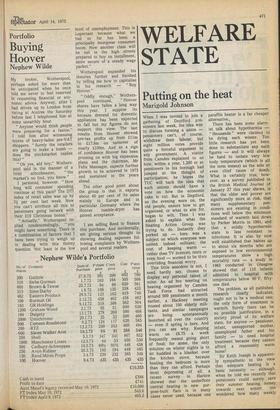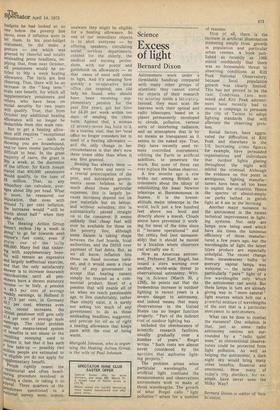Putting on the heat
Marigold Johnson
When I was invited to join a gathering of Deptford pensioners last week, the idea was to discuss forming a union — pensioners can't, of course, withdraw their labour, but eight million votes provide quite a forceful argument to any government. A visitor from Camden explained to us how, within a year, 1,200 or so pensioners in his borough had jumped at the thought of participation; he hopes the TUC will back the idea that such unions should have a vote on how the economic cake is cut. But in Deptford, as the evening wore on, the old people, unsure how to get organised, or what to aim for, began to wilt. Then I was asked to explain what the Heating Action Group was trying to do. Instantly they perked up — here was a subject on which everyone was united, indeed militant; the cost of keeping warm — rather than TV licences, rents or even food — seemed to be their overriding financial worry.
This little anecdote is not, I need hardly say, chosen to display any personal talent of mine. An ad hoc meeting on heating organised by Camden Task Force had attracted around 500 pensioners a month earlier, a Hackney meeting roused about 100 elderly mili tants, and similar campaigns are being spontaneously launched all over the country — even if spring is here. And you can see why. Keeping warm on £6.75 a week frequently means going short of food; for some, the only solution on winter nights is to sit huddled in a blanket over the kitchen stove, because heating the bedroom is more than they can afford. Perhaps most depressing of all, a recent survey in Harlow showed that the underfloor central heating in new pur pose-built flats is in many cases never used, because one paraffin heater is a far cheaper alternative., There has been some alarmist talk about hypothermia — " thousands " were claimed to be dying each winter. Too little research has yet been done to substantiate any such figures — and it will always be hard to isolate very low body temperature (which is all the term means) as the sole or even chief cause of death. What is certainly true, however, as a survey published in the British Medical Journal of January 27 this year shows, is that the older and poorer are significantly more at risk, that many supplementary pensioners are existing in conditions well below the minimum standard of warmth laid down by Parker Morris in 1961, and that a mildly hypothermic state is less resistant to infections. It is also by now well established that babies up to about six months who are exposed to low environmental temperatures show a high mortality rate — a study in 1963 conducted in• Glasgow showed that of 110 infants admitted to hospital with temperatures below 90F, fiftyone died.
The problem, as all published research clearly indicates, ought not to be a medical one; the only form of treatment is warmth. Surely there can be no possible justification, in a society proud of its welfare state, for anyone — pensioner, infant, unsupported mother, unemployed father and his family — to need hospital treatment because they cannot afford a reasonably warm homes Sir Keith Joseph is apparently sympathetic to the view that adequate heating is a basic necessity — although, when he told me recently that pensioners could surely save their summer heating money towards next winter, one wondered how many weekly
budgets he had looked at; no one below the poverty line saves, even if inflation were to let them. In his post-budget statement, he did make a gesture — one which was greeted by cheerful and totally misleading press headlines, implying that, from next October, all pensioners would be entitled to 90p a week heating . allowance. The facts are less Cheering. True, there will be an increase in the "long term" scale rate benefit, for which all supplementary pensioners and Others who have been on social security for two years Will qualify. True, that from October any additional heating allowance will no longer be deductible from this scale rate.
But to get a heating allowance still requires " exceptional Circumstances" — Such as Showing you are housebound, and/or have rooms particularly difficult to heat. In the great majority of cases, the grant is 30p a week, at the discretion Of the officer. Sir Keith Joseph stated that 400,000 pensioners Would qualify, to the tune of million. That, as any schoolboy can calculate, averages about 28p per head. What I is more, he reassured our deputation, that even with around 7/ per cent inflation, the increases would "still be Worth about half" when they take effect.
The Heating Action Group doesn't reckon 14p a week is going' to go far towards next Winter's fuel costs, even if
Yeti' re one of the luc'iy 4,i000. Many feel that tinkerT8 with supplementary benefits will remain an expensive and largely ineffectual exercise, and that the only satisfactory answer is to increase insurance contributions until all pen sioners have a decent statutory :income — in Italy, a pension IS 48.5 per cent of average Weekly earnings, in Holland it 37.5 per cent, in Germany ".7 per cent, whereas even
With recent increases, the
' ptish pensioner still gets only 1.8 per cent of average male earnings. The chief problem
With our means-tested system
of benefits is not abuse or the revolting snooping used to Prevent it, but that it has such a intv take-up — possibly two tildllion people are estimated to , e eligible yet do not apply for 'uPplementary benefit. People rightly resent the ' Icluisitorial and often bewiluering procedure involved in Illaking a claim, or taking it to PPeal. Three quarters of the Pensioners questioned in a .rlational survey were, indeed,
unaware they might be eligible for a heating allowance. So one of our immediate objects is to alert everyone — by offering speakers, circulating social services departments, centres for the elderly, the medical and nursing profes sions, with our poster and guidebook on allowances — so that cases of need will come to light. And it's amazing how quickly a co-operative local office can respond; one old lady we found, who should have been receiving supplementary pension for the past five years, got her Giro for £4.20 per week within ten days of sending the claim form. Against that, a woman cf seventy-seven has been tc!el, cm a routine visit, that her local Office no longer considers her in need of a heating allowance — and the only change in her circumstances is that she's now three years older than w'nen it was first granted.
Heating has always been — along with fares and rents — a crucial preoccupation of the poor, and successive governments seem helpless to do much about these particular expenses; this is largely because increases depend not on raw materials but on labour, and without subsidies, this is automatically passed straight on to the consumer. It seems unlikely that cheap fuel will ever be available for those on the poverty line, although some liaison is taking shape between the fuel boards, local authorities, and the DHSS over payment of fuel debts. But, as we ' all know, inflation hits those on fixed incomes hardest, and it would seem a clear duty of any government to accept that heating cannot simply be treated as a commercial product. Short of a pension that will enable all of us, when we reach pensionable age, to live comfortably, rather than simply exist, it is surely not asking too much of any government to do as those misleading headlines suggested, and provide for all as of right a heating allowance that keeps pace with the cost of being warm.
Marigold Johnson, who is organising the Heating Action Group, is the wife of Paul Johnson.



































 Previous page
Previous page